Recommendation Letter For PhD
[Your Name]
[Your Title/Position]
[Your Affiliation/Organization]
[Your Email Address]
[Your Phone Number]
[Today's Date]
[Recipient's Name]
[PhD Program Admissions Committee]
[University Name]
[University Address]
[City, State, ZIP]
Dear [Recipient's Name],
I am delighted to write this recommendation letter in support of [Applicant's Full Name] who is applying for admission to the Ph.D. program in [Field of Study] at [University Name]. Having closely worked with [Applicant's Last Name] for [duration of your professional relationship, e.g., two years], I have had the opportunity to witness [his/her] remarkable academic prowess, dedication, and passion for research.
As a [your role, e.g., professor/supervisor] in the [Department/Research Group], I have had the pleasure of mentoring [Applicant's Last Name] during [his/her] [mention any significant projects, coursework, or research]. From the beginning of [his/her] academic journey, [he/she] has consistently demonstrated exceptional intellectual curiosity and the ability to think critically, making [him/her] stand out among peers.
Academically, [Applicant's Last Name] has consistently excelled in [his/her] studies, earning top grades and accolades in [mention specific courses or projects]. [He/She] has shown a remarkable ability to synthesize complex ideas, apply theoretical concepts to practical situations, and generate innovative solutions to research problems. Moreover, [his/her] keen interest in delving into the depths of [Field of Study] is evident from [his/her] voracious reading and participation in academic discussions.
One of [Applicant's Last Name]'s most remarkable attributes is [his/her] aptitude for research. [He/She] has been involved in [briefly describe research projects or publications], and I have been consistently impressed with [his/her] ability to design and execute rigorous experiments, analyze data with precision, and draw meaningful conclusions from the results. [His/Her] research skills are complemented by [his/her] strong technical abilities, including proficiency in [mention any relevant software, methodologies, or tools].
Furthermore, [Applicant's Last Name] possesses excellent communication and interpersonal skills, making [him/her] an invaluable team member. [He/She] is an active participant in research group meetings and has presented [his/her] findings in conferences, where [he/she] received positive feedback from the academic community.
Having closely observed [Applicant's Last Name] in both academic and research settings, I am confident that [he/she] possesses the intellectual rigor, dedication, and motivation necessary to succeed in [University Name]'s esteemed Ph.D. program. I have no doubt that [he/she] will make significant contributions to the field of [Field of Study] and will be an asset to the university's academic community.
In conclusion, I wholeheartedly recommend [Applicant's Full Name] for admission to the Ph.D. program at [University Name]. I am confident that [he/she] will thrive in the program and continue to demonstrate academic excellence, research proficiency, and leadership qualities. If you require any further information or have questions, please do not hesitate to contact me.
Thank you for considering [Applicant's Last Name]'s application. I am thrilled at the possibility of [his/her] enrollment at [University Name] and eagerly await [his/her] future accomplishments.
Sincerely,
[Your Name]
[Your Title/Position]
[Your Affiliation/Organization]
Strong PhD Recommendation Letter From Academic Advisor
Subject: Recommendation for PhD Program – [Student Name]
Dear [Admissions Committee],
I am writing to strongly recommend [Student Name] for admission to your PhD program in [Field/Department]. I have had the privilege of supervising [Student Name] for [duration] during their [Master’s/Undergraduate] studies at [University Name].
Throughout this period, [he/she/they] has demonstrated exceptional analytical skills, rigorous research methodology, and a deep commitment to advancing knowledge in [specific area]. Notably, [Student Name] conducted a thesis project on [brief description], producing results that were both innovative and impactful.
In addition to academic excellence, [Student Name] has shown excellent collaboration and leadership abilities, contributing positively to lab meetings and group projects. I am confident that [he/she/they] will thrive in a demanding PhD program and make significant contributions to your research community.
I strongly endorse [Student Name] without reservation.
Sincerely,
[Your Name]
[Position/Department]
[University Name]
Professional Recommendation Letter for PhD – Employer Perspective
Subject: PhD Recommendation for [Student Name]
Dear [Admissions Committee],
I am writing to recommend [Student Name] for your PhD program in [Field]. I have worked closely with [him/her/them] for [duration] at [Company/Organization] in the capacity of [Position/Role].
During this time, [Student Name] has exhibited outstanding problem-solving skills, intellectual curiosity, and a commitment to excellence. [He/She/They] led projects such as [specific example] that required both technical expertise and innovative thinking.
I believe [Student Name]’s combination of practical experience and research aptitude makes [him/her/them] an ideal candidate for advanced studies. I fully support [his/her/their] application.
Best regards,
[Your Name]
[Position]
[Company/Organization]
Informal / Heartfelt Recommendation Letter for PhD
Subject: Personal Recommendation for [Student Name]
Dear [Admissions Committee],
It is a genuine pleasure to recommend [Student Name] for your PhD program in [Field]. I have known [him/her/them] for [X years] as [role/relationship], and I have witnessed both academic brilliance and personal integrity.
[Student Name] approaches challenges with creativity and persistence. One of the projects that impressed me most was [specific example], which demonstrated both independent thinking and dedication to research excellence.
I wholeheartedly endorse [Student Name] for admission, confident that [he/she/they] will bring energy, insight, and commitment to your program.
Warm regards,
[Your Name]
[Position/Department]
[University Name]
Provisional Recommendation Letter Pending Full Review
Subject: Preliminary Recommendation for PhD Application – [Student Name]
Dear [Admissions Committee],
I am pleased to provide a provisional recommendation for [Student Name] for your PhD program. While the full evaluation of [his/her/their] academic record is ongoing, preliminary assessments indicate exceptional capabilities in research and critical thinking.
[Student Name] has shown promise through [specific project or coursework] and demonstrates a genuine commitment to contributing to [field]. I recommend consideration for admission, with the expectation that a full recommendation will follow shortly.
Sincerely,
[Your Name]
[Position]
[University Name]
Recommendation Letter Focused on Research Potential
Subject: PhD Recommendation – Emphasis on Research Ability
Dear [Admissions Committee],
I am writing to highlight [Student Name]’s research potential for your PhD program in [Field]. Over the course of [duration], [he/she/they] has consistently demonstrated originality, perseverance, and technical expertise in [specific area].
Particularly noteworthy is [Student Name]’s work on [project or publication], which involved [brief details]. This project exemplifies [his/her/their] ability to formulate research questions, design experiments, and interpret results independently.
I strongly recommend [Student Name] as a candidate who will excel in rigorous academic research.
Sincerely,
[Your Name]
[Position]
[University/Organization]
What / Why You Need a PhD Recommendation Letter
Purpose and Importance
- Serves as an endorsement of the applicant’s academic and research abilities.
- Provides admissions committees with insights beyond grades and transcripts.
- Highlights personal qualities, work ethic, and suitability for doctoral studies.
- Strengthens the application by adding credibility from respected professionals or academics.
Who Should Write a PhD Recommendation Letter
Ideal Recommenders
- Academic advisors or professors familiar with the student’s research.
- Employers or supervisors with experience in relevant professional projects.
- Senior researchers or collaborators who can attest to research aptitude.
- Should be individuals with authority and credibility in the relevant field.
Whom the Letter Should Be Addressed To
Recipients
- PhD program admissions committees.
- Specific professors or department heads if requested by the program.
- Some programs may require online submission through application portals.
- Occasionally, multiple letters are needed to address different aspects (research, academics, character).
When to Request a Recommendation Letter for PhD
Timing Guidelines
- At least 2–3 months before application deadlines.
- After significant achievements, e.g., thesis completion, publication, or internship.
- Preferably when the recommender can provide recent and relevant insight.
- Avoid last-minute requests to ensure a thoughtful and detailed letter.
How to Write and Submit a Strong Recommendation Letter
Writing Process
- Gather detailed information about the applicant’s achievements.
- Include specific examples of research, academic performance, and character.
- Use a professional and formal tone; avoid generic praise.
- Clearly state your relationship to the candidate and duration of familiarity.
- Submit through official channels (email, online portal, or printed letter) as required by the program.
Requirements and Prerequisites for a PhD Recommendation Letter
Checklist
- Understanding of the applicant’s academic and research record.
- Knowledge of the target PhD program and field of study.
- Access to supporting documents: transcripts, CV, publications.
- Awareness of deadlines and submission procedures.
- Willingness to provide an honest and comprehensive assessment.
Formatting Guidelines for PhD Recommendation Letters
Formatting Tips
- Length: 1–2 pages, concise yet detailed.
- Tone: Professional, formal, and supportive.
- Structure: Introduction, relationship with candidate, specific examples, overall assessment, closing.
- Use official letterhead if printed; digital submissions should follow program instructions.
After Sending / Follow-up Actions
Follow-up Steps
- Confirm receipt with the admissions office if needed.
- Notify the applicant once the letter has been submitted.
- Be available for any clarifying questions or additional information requests.
- Maintain a copy for your own records.
Pros and Cons of PhD Recommendation Letters
Advantages
- Provides credibility and validation for the applicant.
- Highlights unique strengths beyond academic transcripts.
- Can differentiate the applicant from a competitive pool.
Disadvantages
- Requires time and effort from the recommender.
- Overly generic letters may have minimal impact.
- Misalignment between the letter and program expectations can be detrimental.
Common Mistakes in Writing PhD Recommendation Letters
Mistakes to Avoid
- Using vague or non-specific praise.
- Failing to include concrete examples of research or achievements.
- Submitting after deadlines or incomplete letters.
- Overloading the letter with irrelevant personal details.
- Not addressing the correct program or recipient.
Essential Elements and Structure of a PhD Recommendation Letter
Key Components
- Subject line or clear opening indicating purpose.
- Introduction of recommender and relationship to applicant.
- Specific examples of academic or research accomplishments.
- Assessment of skills, character, and potential for PhD success.
- Closing endorsement with signature and contact information.
- Optional mention of awards, publications, or special achievements.
Tricks and Tips for Writing an Impactful PhD Recommendation Letter
Best Practices
- Tailor the letter to the specific program and field.
- Use precise language and evidence-backed statements.
- Highlight both technical skills and soft skills like perseverance or creativity.
- Avoid clichés and overused adjectives.
- Coordinate with the applicant to ensure all achievements are accurately represented.
Compare and Contrast with Other Academic Letters
Differences from Other Letters
- Undergraduate recommendation: More general, focused on grades and personality.
- Job reference: Focused on professional experience and work skills.
- PhD recommendation: Emphasizes research potential, analytical ability, and independent thinking.
- Provides deeper insight into the applicant’s capacity for advanced scholarly work.
Does a PhD Recommendation Letter Require Attestation or Authorization?
Authorization Details
- Generally does not require formal attestation, but should be on official letterhead when possible.
- Signature and contact details of the recommender are essential.
- In some cases, university seals or verification may be requested by the admissions office.

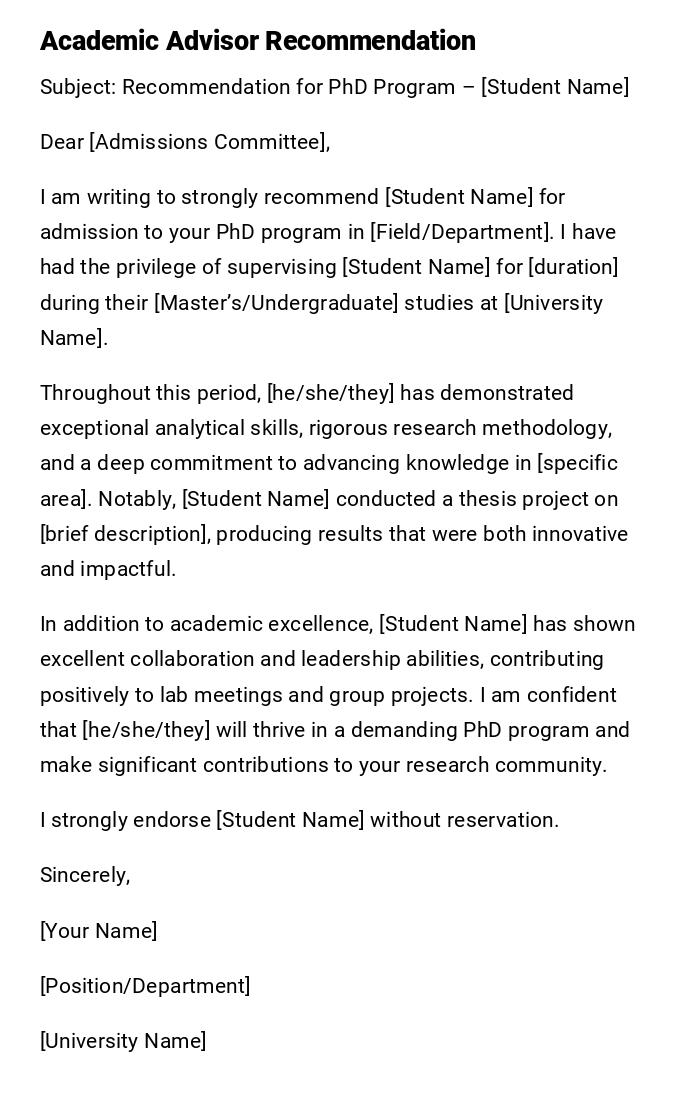
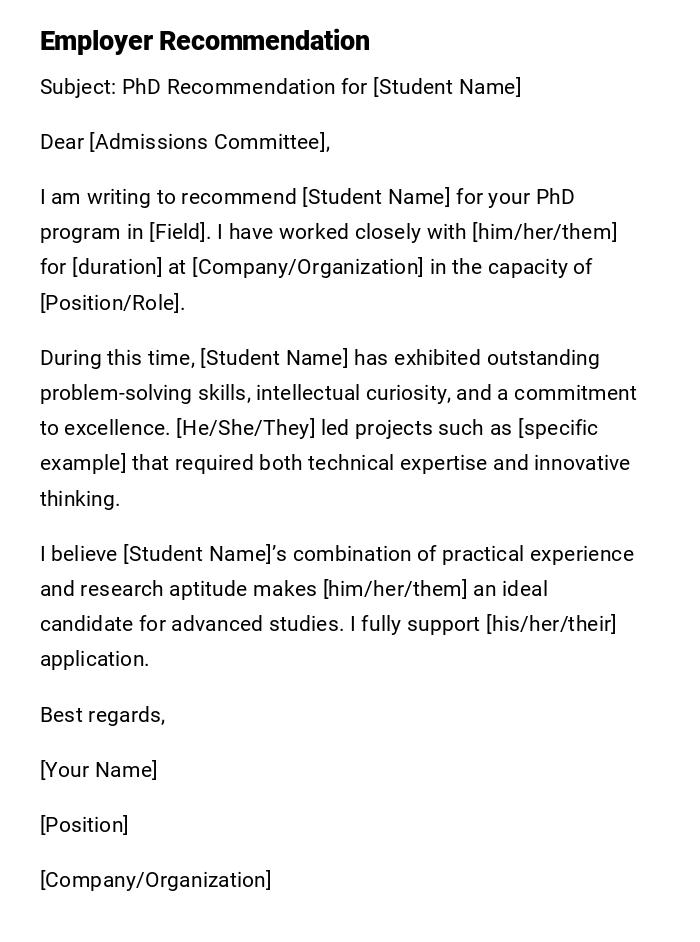
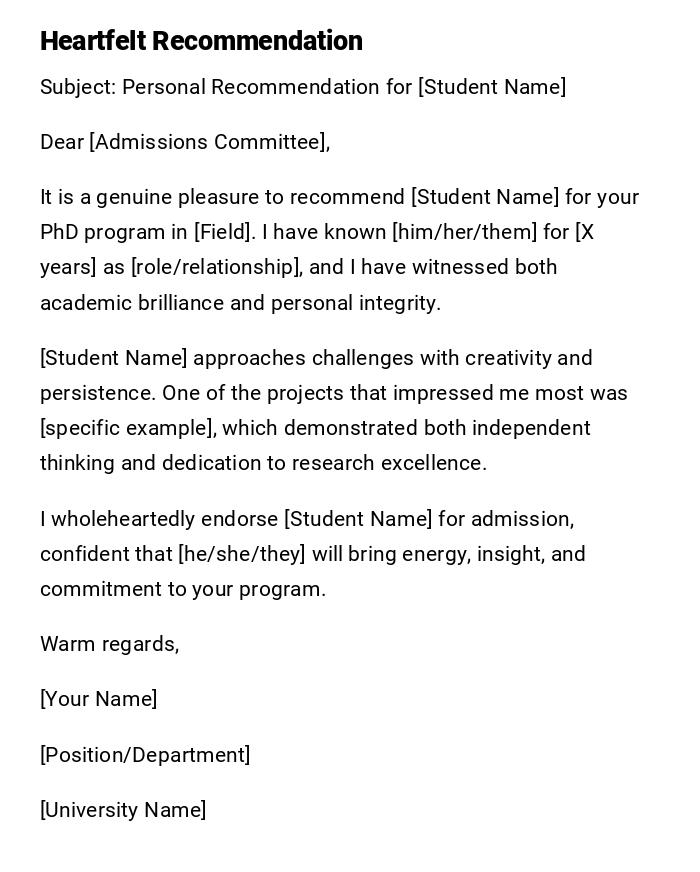
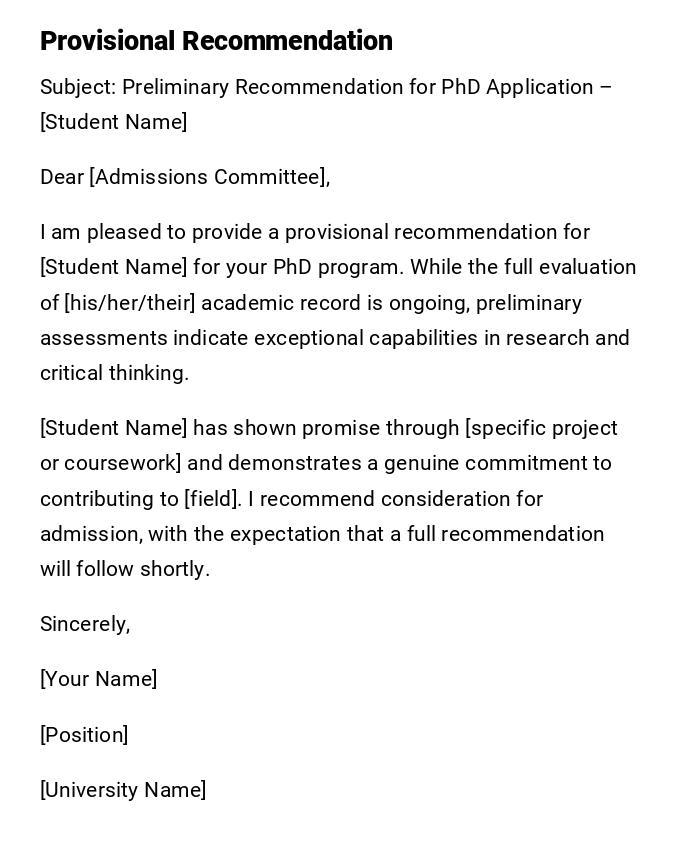
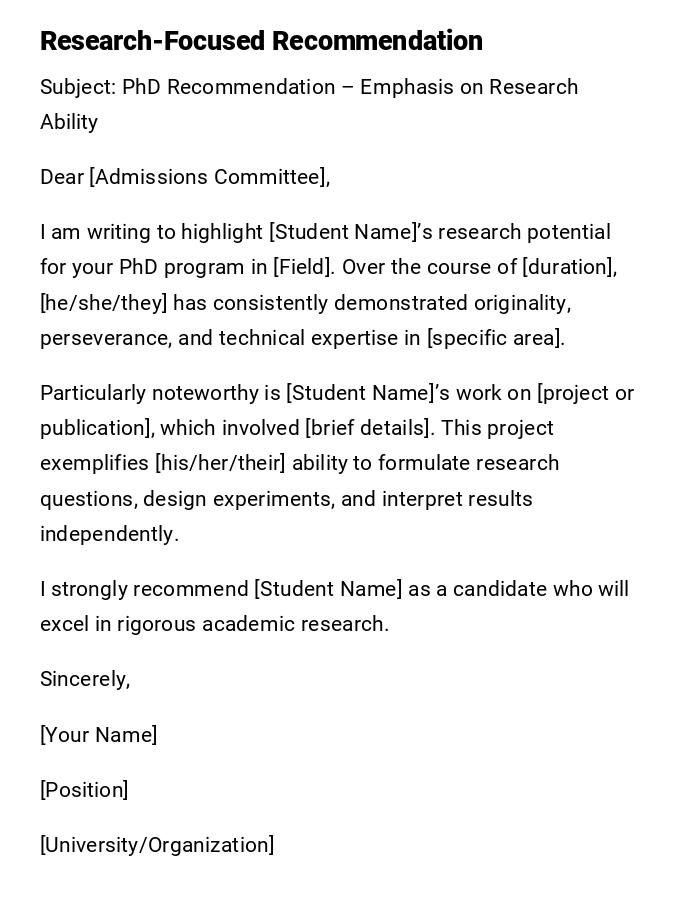

 Download Word Doc
Download Word Doc
 Download PDF
Download PDF